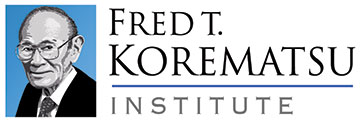The Korematsu Institute Celebrates Mitsuye Endo on International Women’s Day
“Mitsuye Endo was not a person that one would have picked out of the crowd, but she had the courage, tenacity, and moral strength to challenge the federal government on behalf of an entire community. After the war, she lived out her life as a wife and mother near Chicago, Illinois. Historically, the contributions of women like Endo are forgotten or minimized. Mitsuye Endo is a true American hero, who in her quiet way, sacrificed so much in order to free 120,000 men, women and children.” – Japanese American Citizens League (JACL), Mitsuye Endo’s Nomination for the Presidential Medal of Freedom (2015)
Today is International Women’s Day, a global day celebrating the social, economic, cultural, and political achievements of women all around the world. We honor this by sharing the often-overlooked contributions of women to our history, culture, and the betterment of society.
When we think of stories of women who inspire us, we think of Mitsuye Endo. She inspired us not only by giving a voice to the 125,000 innocent Japanese Americans rounded up and removed from their communities during WWII, but she also became the lead plaintiff in the only U.S. Supreme Court case to successfully challenge the unlawful Japanese American Incarceration.
On February 19, 1942, President Franklin Roosevelt signed Executive Order 9066, “Authorizing the Secretary of War to Prescribe Military Areas.” Following the attacks on Pearl Harbor on December 7, 1941, the order stated the need for “protection against espionage and against sabotage.” The result? Over 125,000 people of Japanese ancestry, 2/3 of whom were American citizens, were sent to incarceration sites around the country without cause, without trial, and without recompense. This led to heartbreak, humiliation, and the loss of livelihoods, communities, and history. Endo and her family were among them. She like other Japanese American state employees, was fired after the attack on Pearl Harbor. The Japanese American Citizens League (JACL) and ACLU lawyer James C. Purcell challenged her firing. Later, Purcell selected her and encouraged her to bring a habeas corpus lawsuit against her unlawful detainment under Executive Order 9066. She and her family were first incarcerated at the largest of the camps at Tule Lake in California and later at Topaz in Utah.
She joined three other Japanese Americans, Fred Korematsu, Gordon Hirabayashi, and Minoru Yasui, who each challenged the constitutionality of Executive Order 9066 taking their fights all the way to the Supreme Court. Women often silently make history. The government offered to release her from camp if she would drop her lawsuit. She refused the offer of freedom to continue the fight. Mitsuye Endo not only stood up for what was right, but she and Fred, Gordon, and Minoru also stood up for 125,000 people who were ignored, and in her court case, Ex parte Mitsuye Endo, it was agreed she was right. The government could not detain citizens who were loyal to the United States just because they looked like the enemy. By the time of the decision on December 18, 1944, Endo had never been to court. In an attempt to deflate the impact of the ruling in her favor, the military announced the end of its incarceration policy and associated restrictions on Japanese American citizens the day prior.
The Presidential Medal of Freedom is our nation’s highest civilian honor. Only 647 people have been recognized since it was established in 1963 by President John F. Kennedy. It celebrates the best of us and signifies that any one of us can change the country or the world for the better. In 2015, U.S. Senator Brian Schatz (D-Hawai‘i) urged then-President Barack Obama to bestow the Presidential Medal of Freedom on Mitsuye Endo in honor of her “extraordinary choice to forego her own freedom in order to secure the rights of 120,000 Japanese Americans who were wrongfully imprisoned without the benefit of due process.”(1) In 2015, the California Assembly passed Senate Joint Resolution No. 12 in support of her nomination for a medal.(2) In 2016, Amanda L. Tyler, a UC Berkeley School of Law professor, wrote an op-ed for the Sacramento Bee in Endo’s hometown, recommending the same.(3)
In the window between 1998 and 2015, civil rights heroes Fred Korematsu, Gordon Hirabayashi, and Min Yasui were honored for standing up for what is right in the face of gross injustice in response to Executive Order 9066. Their cases were not successful at the Supreme Court but were overturned by a writ of coram nobis in 1983. Mitsuye Endo remains the only one who fought the injustice of Executive Order 9066 but has never received our nation’s highest civilian honor for her efforts. As part of Mitsuye Endo’s legacy, we can hope for a future where we never allow the same fear and ignorance to grab hold of our decision-makers to repeat the same terrible, xenophobic mistake without an uproar in opposition. We can all commit to working together to educate for equal rights and justice for all and a future we can be proud to share. On this International Women’s Day, the Fred T. Korematsu Institute hopes Mitsuye Endo joins the ranks of the 647 other honorees as a hero of the U.S. Constitution, for honoring the rule of law, and for standing up for what is right with a posthumous Presidential Medal of Freedom.
(1) – “Senator Schatz Recommends Mitsuye Endo for Presidential Medal of Freedom”. Accessed February 28, 2024. https://www.schatz.senate.gov/news/press-releases/senator-schatz-recommends-mitsuye-endo-for-presidential-medal-of-freedom
(2) – “Senate Joint Resolution No. 12—Relative to Mitsuye Endo Tsutsumi”. Accessed February 28, 2024. http://www.leginfo.ca.gov/pub/15-16/bill/sen/sb_0001-0050/sjr_12_cfa_20150821_122252_asm_comm.html
(3) – “Unsung WWII hero deserves the Medal of Freedom.” Amanda L. Tyler, The Sacramento Bee. Accessed March 2, 2024. Read more at: https://www.sacbee.com/opinion/california-forum/article97641497.html#storylink=cpy
